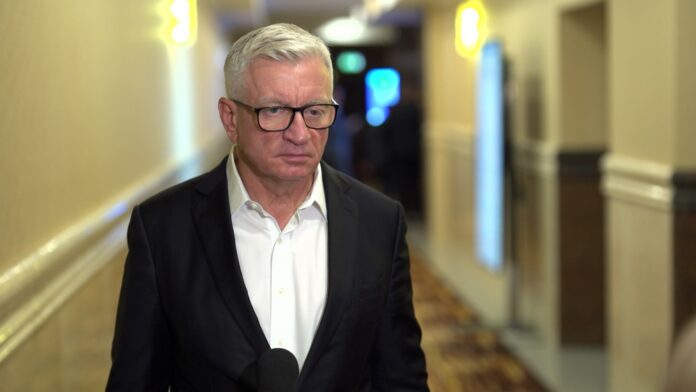For the past four years, local governments have been forced to patch increasing gaps in their budgets. Decreasing revenues from PIT tax, the pandemic, the war in Ukraine, the refugee crisis, inflation, high energy prices, and the lack of funds from the National Recovery Plan have made it difficult for them to plan any major expenses. The situation is further exacerbated by regulatory instability and a growing number of tasks transferred to local governments, resulting in increased budget expenditure. “One of the major challenges in this area at the moment is social care,” says Poznan’s mayor Jacek Jaśkowiak.
“We have first experienced the pandemic, then the war between Russia and Ukraine and the migration crisis, as well as many other challenges for local government, including those related to cost. We also have a host of social changes: on the one hand, the smallest number of births since World War II, on the other – the largest number of court rulings obliging us to find foster care for children. Additionally, there are a number of legislative changes that alter the situation of local governments, depriving us of certain income,” Jaśkowiak said.
The unfortunate changes for local governments began in 2019, with the introduction of tax changes that depleted their income from PIT tax. This is one of the biggest sources of budget income for local government units. The situation was further worsened by the introduction of the Polish Deal, which came into effect at the beginning of last year. Consequently, the basic income tax rate has fallen from 17% to 12%, people up to 26 years of age do not pay at all, the tax-free amount has increased to PLN 30,000, and the second social tax rate has been moved from PLN 85 thousand to PLN 120,000. Despite appeals from the local government community, the government did not decide to increase the local government’s share in PIT, offering only partial compensation. As a result, only local governments will lose about PLN 30 billion in PIT tax revenues in 2023, and the cumulative deficit from 2019 is estimated to be PLN 65 billion, as estimated by the Union of Polish Cities.
The financial situation of local government units was further worsened by the outbreak of the war in Ukraine in February 2022, which resulted in local governments being burdened with handling the migration crisis and accommodating hundreds of thousands of refugees. This was compounded by high inflation and a sharp rise in energy costs and labor costs. Moreover, repayment of loans and bonds taken out by local governments is now many times more expensive than even two or three years ago. Another factor affecting their financial situation is the uncertainty associated with EU funds, especially the National Recovery Plan, from which local governments were expected to receive 31 billion euros. However, so far, it is still not known when or if at all it will happen.
The Union of Polish Cities also draws attention to a number of unfavorable legislative changes for local governments that destabilize budgets, which are already weakened, and an arbitrary system of financing. In this situation, they say, it is difficult to plan anything. “These are the major challenges and problems. But in this situation of uncertainty – partly independent of anyone, like the pandemic or the war in Ukraine – we need clear rules of the game. Not just for next year, but for the next few years, because only then can we sensibly plan,” says the mayor of Poznan.
Many representatives of the local government community believe that the last two years have been the hardest period for local government units since the beginning of the political system reforms. All unfavorable events and changes have resulted in many of them – even the richest ones, like Warsaw – having a negative balance in 2023 and planning their budgets with a large deficit. This in turn creates a risk of freezing expenditures for key investments, which are the easiest to cut, but also expenditures for culture, sport and education maintaining extracurricular activities, necessary repairs or massive cuts in public transport.
“Investment unfortunately needs to be adjusted. Every year we have a situation in which, due to price increases, the labor market situation and the situation in the construction industry, which changed suddenly after the outbreak of the war, we have to make some corrections. In the situation when the legislature – rightly – introduced changes guaranteeing the contractors additional remuneration due to inflation, we also have to take into account the increase in costs, adjust the duration of these investments and explain this to the residents, ” says Jacek Jaśkowiak.
In recent years, the problem is also the growing number of tasks transferred to local government units, related to education, resulting in an increase in budget expenditures. These expenses are growing faster than income, which is why the hole in the budgets of local government units has been growing for four years. As the mayor of Poznan points out, there are also unfavorable demographic trends, which are increasing the number of negative social phenomena. In this situation, it is up to local governments to bear the burden of ensuring care for groups such as children or elderly people, who no one else will look after.
“In Poznan, the biggest challenge at the moment is reacting to the changing social changes, especially securing additional places in children’s homes, that is, creating conditions for the development of the children whose parents do not care for them. There is no point in moaning that this is the case and that such situations arise, these children need to be taken care of,” says Jacek Jaśkowiak.
As he emphasizes, the city has spent about PLN 30 million on this over the past few years, but this is still a drop in the ocean of needs. “The change in the functioning of this most important social cell, which is the family, and the fact that there are no longer these bonds, multi-generational families, and many people have gone abroad, also means that we have to create the right conditions in nursing homes. Here, without a doubt, state support is necessary, because with these finances that we have, it is hard for us to do this. Investments in these types of facilities are needed, as well as to prepare and finance the staff who will look after both children and the elderly, ” says the mayor of Poznan.


















